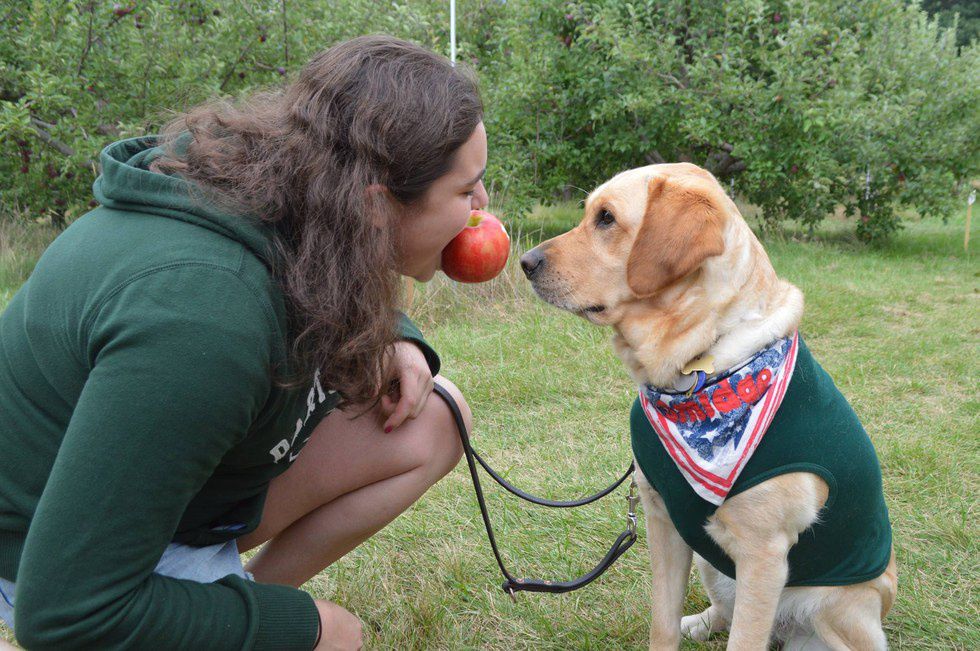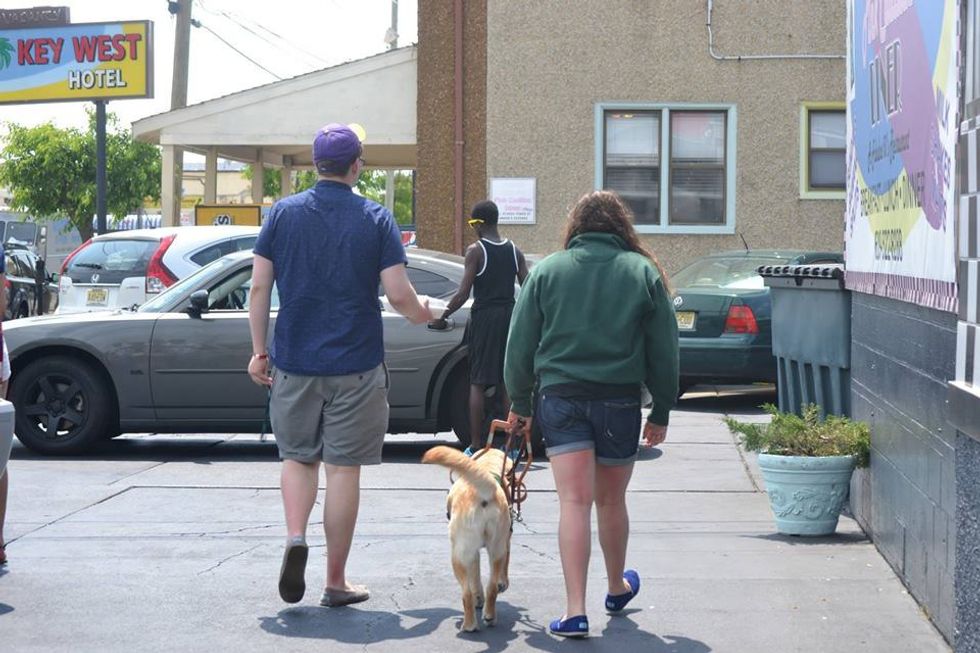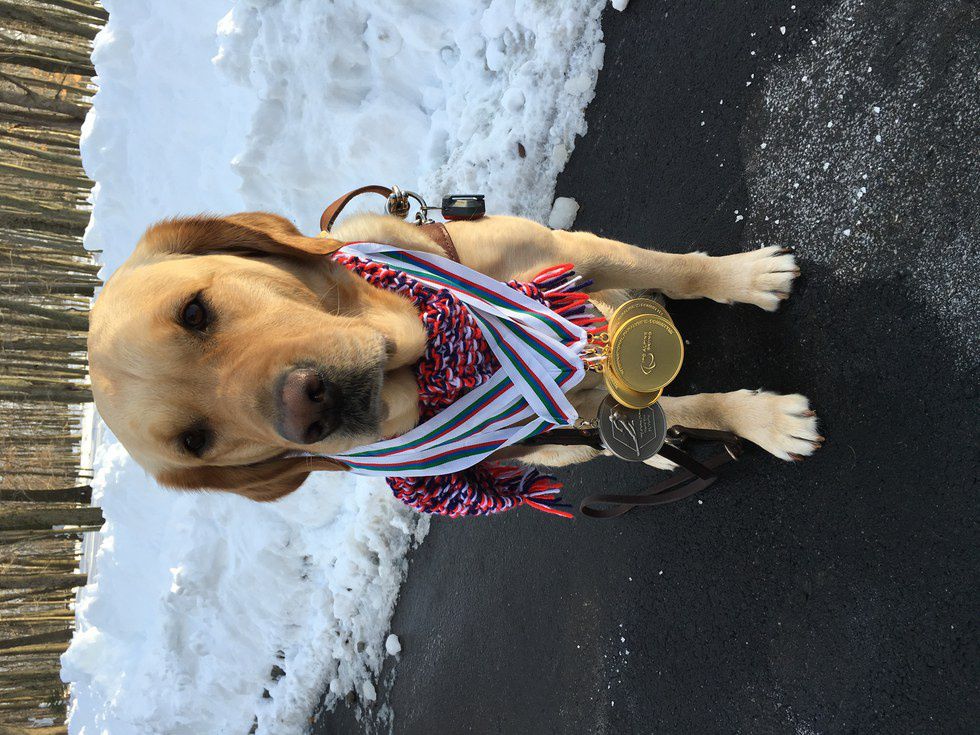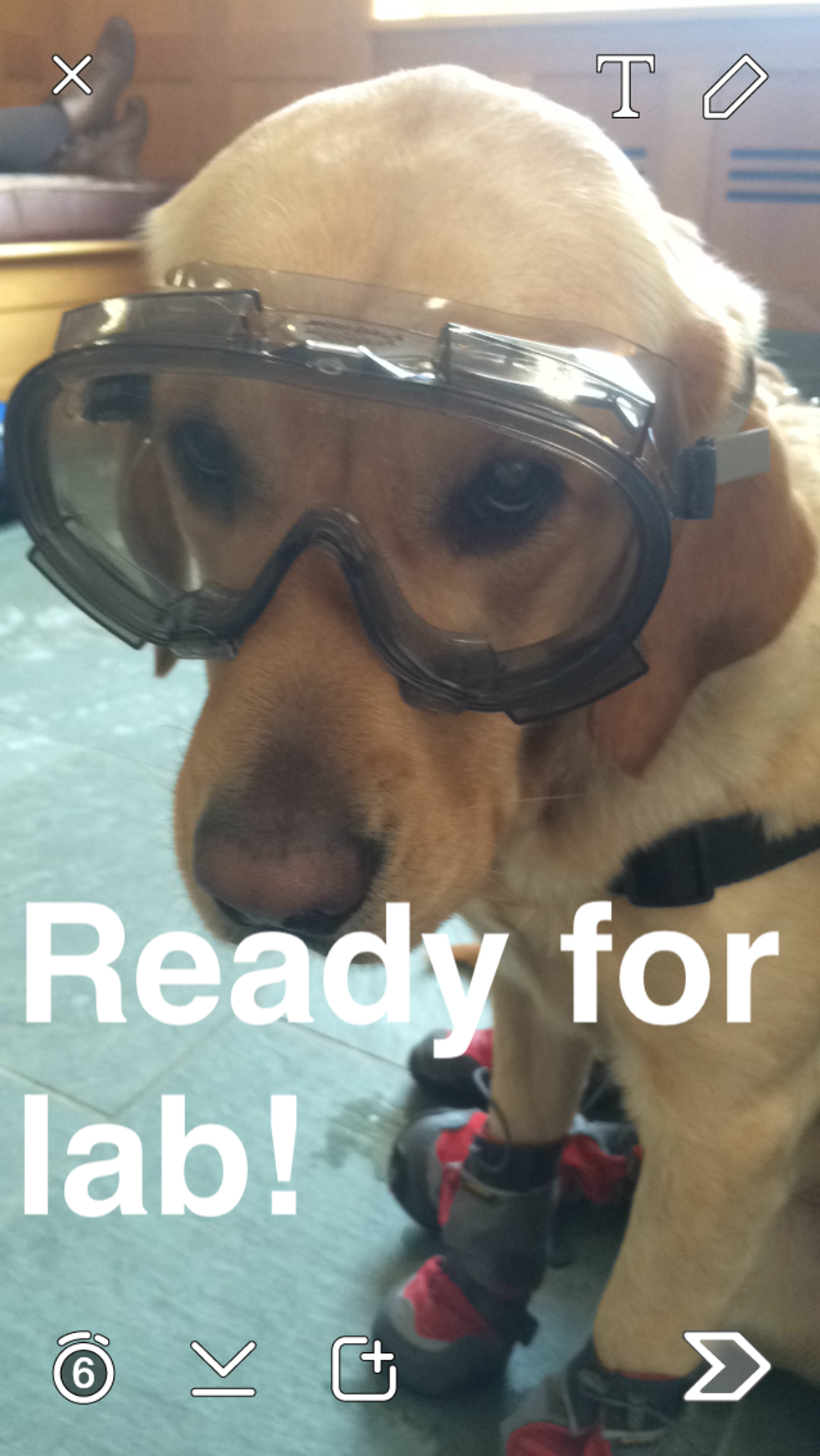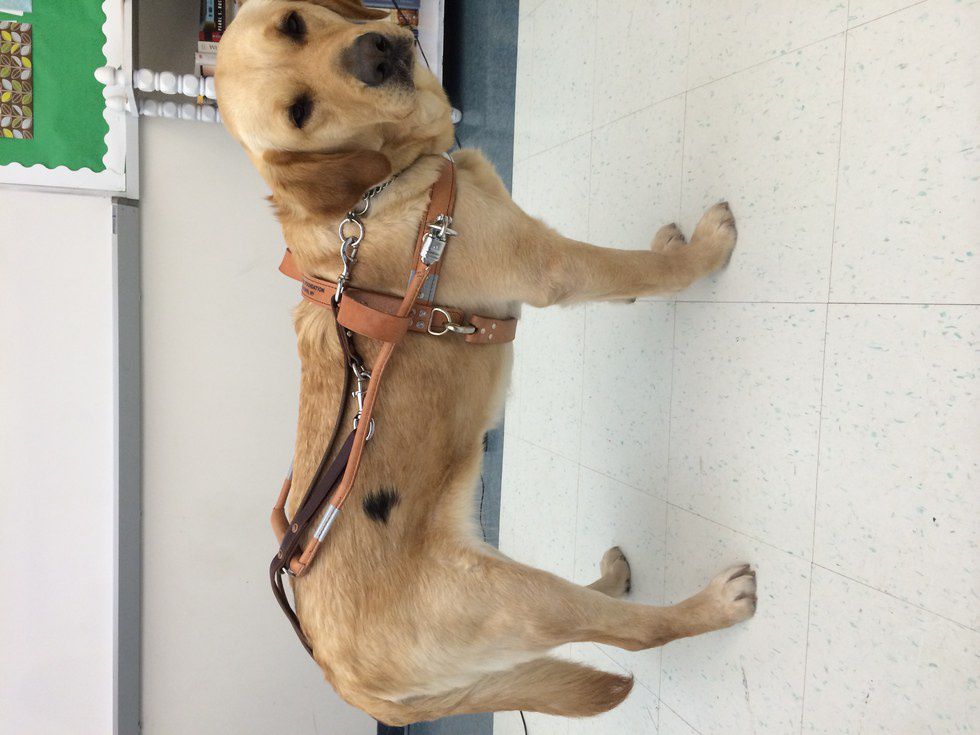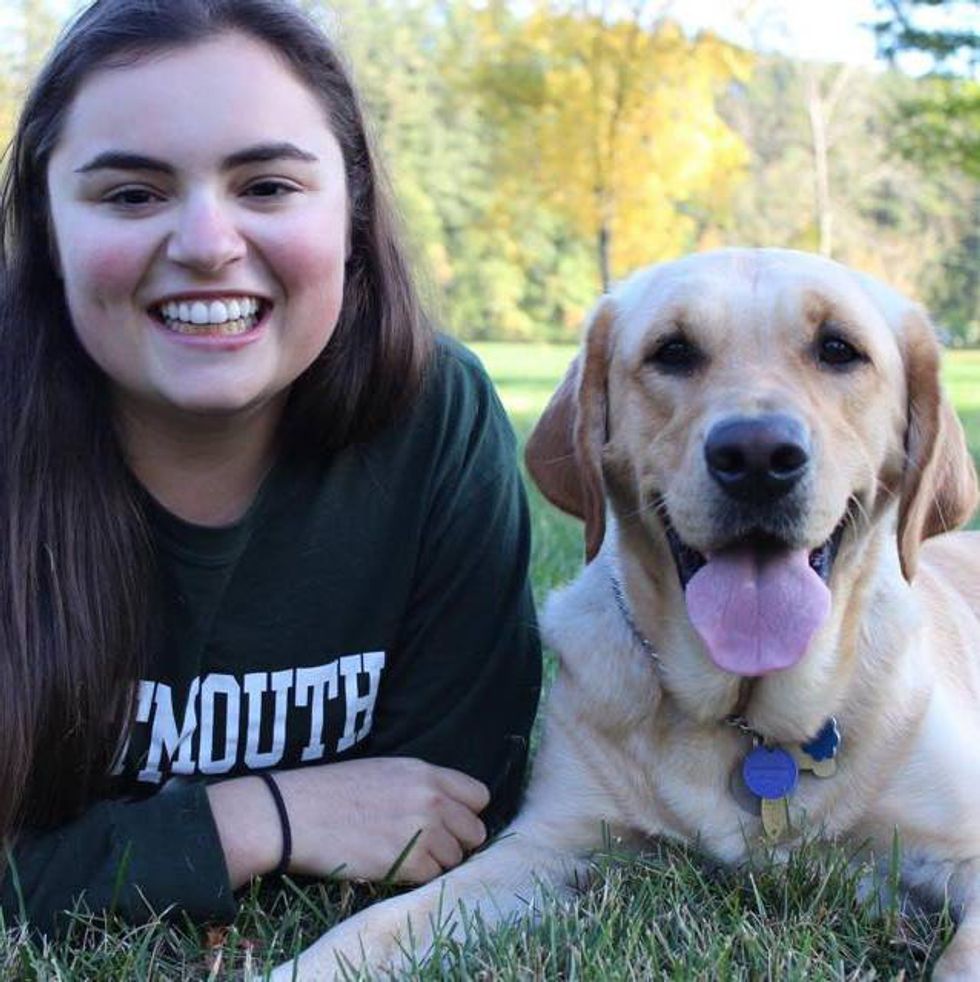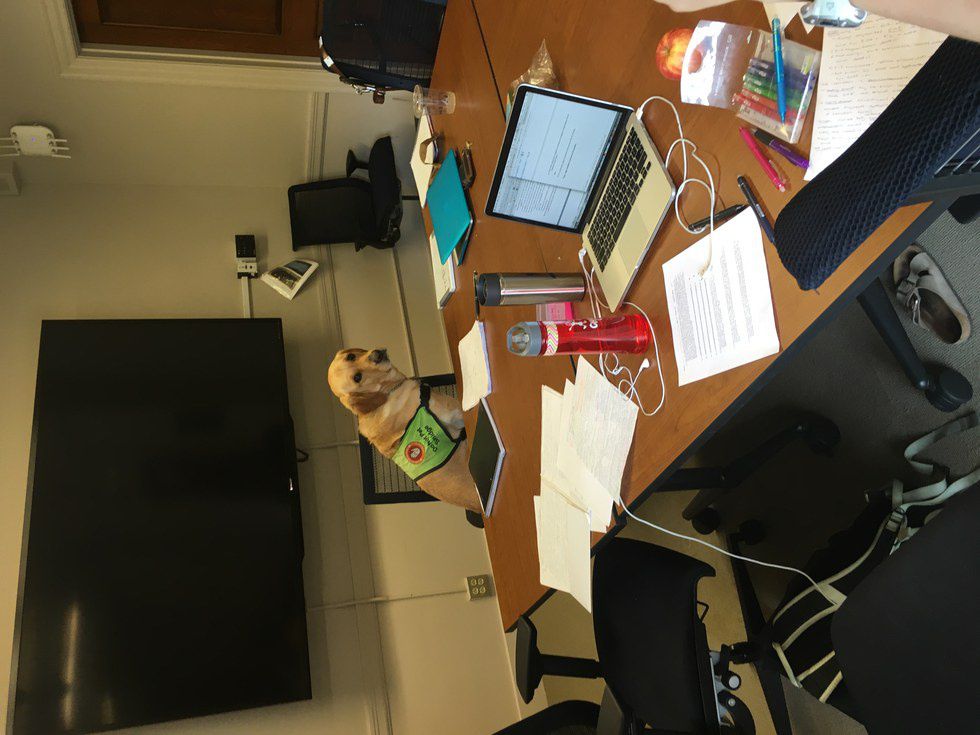My guide dog, Smidge, is kind of a celebrity at Dartmouth. Somehow Smidge has managed to accumulate exponentially more friends than I have in the two years we have been in Hanover. Her puppy dog eyes and wiggly butt really seems to elicit happiness from almost everyone she comes into contact with. I was matched with Smidge, a 4 year-old Labrador golden retriever mix, by the Guide Dog Foundation for the blind in April of 2014. She has a small “smidge” of black on her right hip, so that’s how she got her name. Smidge is a great dog. In her eyes, her soul purpose in life is to make sure that I am safe, and for that I am eternally grateful to have her. She is an extra pair of eyes when I fail to see parts of the world around me. Smidge has given me the independence I have always wanted without ever leaving me to do things alone. She would do anything to keep me safe, and even when she is off-harness and “not working” she is always trying to use her vision to make up for my lack of vision. Watching Smidge do her job is amazing and it is understandable that seeing a service dog often elicits questions. Here are a few of the most common questions I get asked about Smidge.
1. Can I pet your dog?
Well that depends. When Smidge is working the answer is no. When I am walking around in public with Smidge in harness that indicates she is working. When Smidge is working she has one job to do: guide us safely from point A from point B without getting distracted. Distractions can be very dangerous for a guide dog team, so I ask respectfully that if Smidge is working people should ignore her. I understand that this can be really difficult— she really does have some heart- wrenching puppy dog eyes— but this is a very important rule. When she is out of harness though I usually allow her to say hi to people, so feel free to ask. Many service dog handlers follow different rules about petting their dogs so it is always a good idea to ask beforehand.
2. Are you training her for someone else?
People ask me this a lot and I can’t really figure out why considering she isn’t a puppy but no, turns out she’s all mine. It is understandable though. I am a really unique guide dog user because I actually do have a fair amount of usable vision. Before I got Smidge I never used a cane or mobility tool, which often surprises people, but I also never confidently navigated any new place by myself. When I first started working with Smidge I felt like she was actually taking away some of my independence, and I didn’t want to be taking such an amazing and valuable dog away from someone who might have needed her more than I do. I spent two weeks at guide dog school on the Guide Dog Foundation campus in Long Island and luckily their amazing trainers convinced me to give this whole guide dog thing a try. I am so glad they did because Smidge completely changed my life. Shout out to all those puppy raisers out there, particularly the family that raised Smidge. Your time and dedication changes lives. Thank you!
3. Does smidge know when to cross the street?
Everything that Smidge does is usually signaled by my command. No, she cannot decide for us when it is safe to cross the street. I decide that by listening to the traffic and knowing when the road is quiet, it is safe to walk. However, guide dogs are trained in “intelligent disobedience”. What “intelligent disobedience” means is that Smidge is trained to deliberately disobey my command if I ask her to do something that may put us in danger. For instance, if I ask Smidge go forward across a street and a car is coming she will deliberately disobey me to protect us from getting hit by the car.
4. Does Smidge ski with you?
Surprisingly I actually get this question quite a bit. The answer is no, Smidge cannot ski with me. I ski following a fully sighted person. I don’t really understand how a dog skiing would work. Like four skis or two? Open to any and all ideas for this one.
5. How did smidge do in orgo?
Smidge is the first student to sleep through every class at Dartmouth and still manage to pass. Who are we kidding? Smidge probably would have done better on those exams than I did. She has gone to every class I have taken at Dartmouth, I will be very disappointed if she doesn’t get a diploma when we graduate.
6. How long will Smidge work for you?
Guide dogs tend to have a working life of about 5-8 years. I expect that I will work Smidge for a few years after I finish school at Dartmouth. It also depends on the individual dog and how well that dog is keeping up with the work load. I will work Smidge for as long as she is willing and able to do her job. Then she’ll get to live out her life as a family pet. Smidge has spent countless hours doing right by me, it is my responsibility as her handler to give her the retirement she deserves.
7. Does Smidge live in your room?
I always find this question to be a little comical. Where else would smidge live? Yes, smidge lives in my room with me and my lovely roommates. She has her own dog bed underneath my bed and I am pretty sure everyone agrees she is the messiest roommate. She sheds way too much!
8. Can Smidge do any tricks?
I guess to the average person the answer is no. Smidge doesn’t really know basic dog tricks like “roll over” or “play dead”. Once I did teach her how to “Fist bump” to amuse some of my friends, but Smidge knows multiple verbal commands that help me navigate every day. Besides being incredibly obedient, Smidge knows basic directions like “left” or “right”. She knows how to navigate me around things I may run into, and can find an empty seat in a classroom. When I am disoriented, I can ask smidge to find the steps, stairs, elevator, escalator, or sidewalk and she will bring me right where I need to go. While she may not know the ordinary tricks most dogs know she definitely does have a few tricks up her sleeve.
9. Do you like having a dog in college?
Having a dog in school is not for everyone. It is a huge responsibility to not only take care of myself but also my dog. I don’t think having a dog would work for a lot of college students, but for me I wouldn’t want it any other way. Smidge has given me so much independence and happiness. I could not imagine my Dartmouth experience without her.





